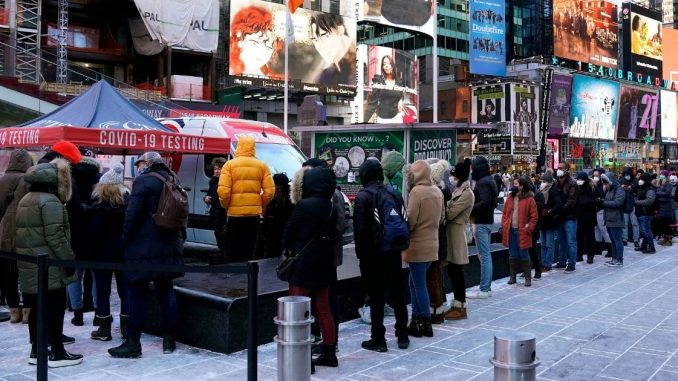
There is good news coming out of the Northeast, where the COVID-19 omicron variant first surged, as daily case numbers are on the decline.
So regardless of the hyped cable news reporting, we appear to have already passed through the worst.
If South Africa’s experience is instructive, we are likely weeks away from a far different COVID picture in the United States.
Further, medical experts point out that a silver lining in the rapid spread of omicron will be increased levels of natural immunity as people recover.
The New York Times tracker shows the Northeast appears to be the first region in the country where the number of cases peaked as of earlier this week.
New cases slowed down in US 🇺🇸 Northeast cities
"In places that first saw a surge of Omicron last month, new infections started to level off or
📉. Slower spread in the Northeast raised the prospect that a national peak may be approaching"https://t.co/axElWCkPZU@thehowie pic.twitter.com/Pg8Qc1j6qq— Covid News (@covidgoodnews) January 14, 2022
Hard-hit New York City, which reached over 40,500 new cases a day last week, is now down to approximately 37,000.
The District of Columbia is averaging about 1,700 new cases per day, down from an early January peak of over 2,100.
“In Boston, the amount of the Covid virus detected in wastewater, which has been a leading indicator of case trends in the past, has plunged by about 40 percent since its peak just after Jan. 1,” the Times reported Thursday.
David Rubin, who tracks national coronavirus trends for PolicyLab at the Children’s Hospital of Philadelphia, told The Washington Post that federal data is showing a sharp decline in emergency room visits in the Northeast.
Some US 🇺🇸 states that got early hit by Omicron (mostly in the Northeast + Puerto Rico 🇵🇷) are now showing signs of peaking, and some are even starting descent in daily identified cases like NY, NJ, Delaware, PR, DC & Maryland.#Omicron #COVID19
Source: https://t.co/pU252C7BaK pic.twitter.com/qvLO4cebID
— Covid News (@covidgoodnews) January 12, 2022
“You got a picture of an East Coast that’s rapidly improving, a Southeast that’s not far behind, a Midwest that’s maybe a week behind the East Coast while the West Coast has not yet peaked,” Rubin said. “Our assessment is we have likely peaked as a country.”
Ali Mokdad, a professor of health metrics sciences at the University of Washington in Seattle, shares the view that omicron has peaked.
“It’s going to come down as fast as it went up,” Mokdad told The Associated Press on Wednesday.
Tom Frieden, a former Centers for Disease Control and Prevention director and New York City health commissioner, said omicron was more like a “flash flood” than a wave.
“It goes to enormously high levels very quickly and then, based on other parts of the world, may come down very quickly,” he told the Post.
That was certainly the experience in South Africa, where omicron was first detected.
The new case daily average went from a mid-December peak of 23,400 cases per day to about 6,000 per day, a more than 70 percent drop.
So omicron passed through South Africa in about a month as opposed to the delta variant-dominant third wave, which lasted for several months.
It should be noted that the COVID vaccines are proving less effective against preventing infection with omicron but still are providing protection against hospitalization and death, Healthline reported.
Dr. Robert Malone — who helped invent the mRNA technology used in the Pfizer and Moderna COVID-19 vaccines — suggested that God may have given the world a “Christmas present” in the form of the omicron variant.
Appearing on the Fox News program “The Ingraham Angle” shortly before Christmas, he said omicron may well do what vaccines have not been able to fully accomplish to date: provide strong immunity.
“If you believe in a God, this looks an awful lot like a Christmas present,” Malone said, pointing out that rather than going into the deep lungs as delta and other variants do, which can lead to serious illness, omicron has shifted to the upper airway, indicating that the virus is weakening.
“So the good news with omicron is very low disease, highly infectious. It looks an awful lot to the experienced vaccinologist like a live-attenuated virus vaccine that you might design for purpose,” he contended. “It’s going to elicit a strong mucosal immune response.”
“This is about as good as we could possibly want right now in terms of outcomes.”
Monica Gandhi, an immunologist at the University of California, San Francisco, concurred that omicron might turn out to be a blessing in the end.
“I hope this variant creates profound immunity in the population,” she told Bloomberg.
“It will hopefully end the pandemic.”
As the Good Book exhorts us, “think about these things” — on the good reports about omicron being quickly on the decline, being less severe and increasing natural immunity in the population — and don’t allow media COVID hype to get you down.
